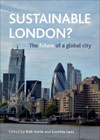Sustainable London? The future of a global city

This book places a big question mark against the sustainability of sustainable development policies and their role and contribution to sustaining the places, environments and people in London.
That sustainability is an ambiguous and highly debated concept, which is translated into tension-laden sustainable development policies, will not come as a surprise to readers. This is particularly so in the context of a large, diverse and rapidly changing city such as London. However, the level of detail of the authors’ analyses, which in many chapters is based on extensive interviews and long-term engagement with particular case studies, adds depth to the sustainable development discourses in and about the city.
In particular, the chapters engage with the socio-spatial dimensions of the discourses in different policy fields, such as housing and property development, education and migration. They elaborate on the challenges that come when a discourse is used as a political rhetoric to serve the “economic growth first” agenda. The book highlights the (social) injustices that market expansion and the privatization of spatial development produce. However, they also examine actors and actions that aim to (re)claim local capacities and with the “right to the city”.
Part 1 focuses on London’s sustainability challenges, as illustrated with “Just Space”, which brings together the needs of London’s communities with academic and professional experience to work on issues related to housing and regeneration. Part 2 asks how London can be sustained, especially considering the increasing influence of partnerships between private companies and government bodies that are established in London’s 32 boroughs. Agendas of good governance, localism and migration policies, as well as recent social benefits cuts, are critically examined to analyse the patterns and structures that influence the dissonance between different actors (mainly communities, different levels of government, and private companies), and their ability to shape the sustainable development and urban planning discourses. Part 3 puts social sustainability at the forefront and elaborates how local governments frequently use this concept to justify regeneration and the demolition of housing. It reveals the consequences of this rhetoric for displacements of low-income inhabitants, state-led gentrification, the relation between housing and education, and the increasing marketization of public spaces. The final part looks closer at the environmental aspects of sustainable development policies and describes the apparent gaps between ambitious environmental targets – such as CO2 reductions in the transport sector or health improvements – and the often insufficient policies designed to achieve them.
London is frequently presented as a global city and sometimes as a frontrunner in sustainable development. However, this book clearly points out that some policies are not only ineffective, but can also be harmful, particularly in the field of housing and regeneration. Those who are familiar with London/UK politics and contemporary urbanism will find this book full of critical arguments to enrich the debates on sustainable urban planning and socio-spatial justice.
Book note prepared by Julia Wesely
Search the Book notes database
Our Book notes database contains details and summaries of all the publications included in Book notes since 1993 - with details on how to obtain/download.
Use the search form above, or visit the Book notes landing page for more options and latest content.
For a searchable database for papers in Environment and Urbanization, go to http://eau.sagepub.com/

